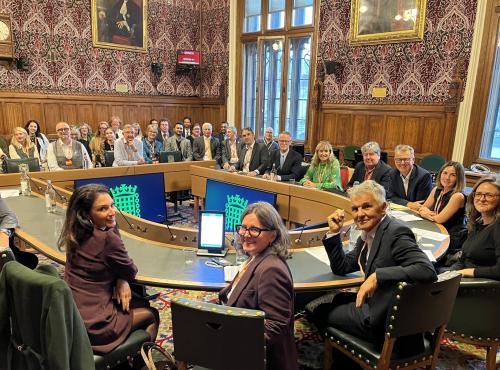Conference Season Roundup: Skills Politics in a Post-Reshuffle Landscape
The autumn conference circuit has been largely defined by Labour's ‘machinery of government changes’ and the opposition parties' responses to a government now fifteen months into power. For education and skills professionals, September's cabinet reshuffle fundamentally altered the policy terrain, with Skills England's absorption into the Department for Work and Pensions representing the most significant structural change since its establishment in 2024.
Labour's most substantial change represents either strategic alignment or bureaucratic upheaval, depending on perspective. The move of the skills brief from the Department for Education to the Department for Work and Pensions was confirmed during the September cabinet reshuffle and has attracted criticism from policy experts concerned about "another upheaval" in skills governance. UK Skills policy, often bouncing around different departments (e.g., Department for Business, Innovation and Skills until 2016, and then solely in DfE until 2025) has once again transferred, straddling between two departments. This creates a complexity around the division of responsibilities and accountability. With higher education, further education and careers for under-19s remaining with DfE, whilst apprenticeships and Skills England moving to DWP, the boundaries between departments appear arbitrary at times. Further, it is important to note that although DWP has a UK-wide employability brief, Skills England (and the DfE) only focuses on England. The Work and Pensions Select Committee has already highlighted a "patchwork of services" where responsibilities fall through departmental cracks - a problem this reshuffle may exacerbate rather than resolve.
Chancellor Rachel Reeves' Youth Guarantee announcement promises to "abolish long-term youth unemployment" through guaranteed paid work placements for 18-21 year-olds claiming Universal Credit for eighteen months. However, the policy's emphasis on conditionality raises serious concerns about vulnerable young people. During Policy Connect’s Labour Party Conference breakfast roundtable, we heard concerns from stakeholders that this policy, although a welcome move, would target a very small proportion of young people in need of help, via a policy that emphasises conditionality. The guarantee's requirement for 35 hours weekly engagement, with benefit withdrawal for non-compliance, risks pushing already marginalised young people further from support. Our ongoing NEET inquiry will address the design of the policy – although there are positive ambitions and intentions to facilitate real change, the details of its implementation leave questions regarding the lack of policy stability and coherence in the skills landscape.
Maintenance Grants: Welcome Support, Questionable Funding
Education Secretary Bridget Phillipson's announcement of targeted maintenance grants represents genuine progress on student support, yet the funding mechanism and eligibility restrictions have generated significant sector concern. The grants, funded by an International Student Levy estimated at 6%, are predicted to cost institutions £621 million annually. In our previous reports, Policy Connect has called for various reforms to students’ maintenance fees, such as calling for the expansion of eligibility requirements for maintenance loans, reinstating grants, and so on. However, the caveat of the proposed levy is that it could damage the experience of students and heighten pressure on universities - reducing resources for teaching, research and student support.
The restriction to "priority courses" aligned with industrial strategy priorities has also drawn criticism, with experts concerned that it will exacerbate problems faced by students in certain disciplines, with the humanities and the arts being most affected. This realignment could potentially funnel students from low-income backgrounds into vocational courses, limiting their subject choices. It also communicates to those very students that the humanities and arts remain a privilege for those who can afford it, ignoring the role that the Social Sciences, Humanities and the Arts for People and the Economy (SHAPE) play in driving innovation and addressing societal challenges. Maintenance grants are supposed to represent financial support for those who are struggling to keep up with the demanding costs of higher education – but packaging this support mechanism as an incentive to enter certain fields over others further divides the student body and reduces student choice.
In the wider context of skills policy, it is difficult to understand where these announcements are situated. The long-delayed White Paper for a Post-16 Skills Strategy would have offered much needed clarity on the agenda for skills amidst the succession of siloed policy announcements.
Conservative Opposition: What’s the Alternative?
The Conservative conference in Manchester has displayed a focus on technical discussions over broader strategic questions. The absence of alternatives to Labour’s institutional changes such as Skills England reforms and an overt focus on the Online Safety Act from the Shadow Education Secretary suggest the party is yet to reframe its policy in a changing skills and youth policy landscape.
Liberal Democrat Ambition: Generous Proposals, Unclear Implementation
The Liberal Democrats' formal adoption of their £10,000 Lifelong Training Grant represents the most generous skills entitlement proposed by any major party. Disbursed at ages 25, 40, and 55, the policy offers genuine scope for career transitions and upskilling throughout working life. Combined with commitments to reform Skills England into a Parliamentary-accountable body and guarantee apprentices minimum wage rates, Liberal Democrats have positioned themselves as champions of lifelong learning.
However, the policy's £10,000 value - doubled from their previous proposal - raises questions about fiscal credibility. With no clear funding mechanism beyond general taxation, the commitment appears designed for opposition rather than government implementation. The party's promise to extend Pupil Premium to post-16 learners and equalise college-school sixth form funding addresses genuine equity concerns, yet again lacks detailed costings or implementation timelines.




